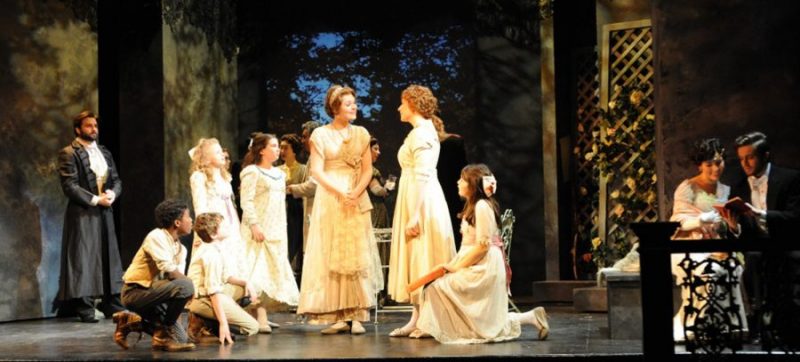
Werther by Jules Massenet. Academy of Vocal Arts, Philadelphia, 2016
The self-destructive title character of Werther, created by Goethe in 1774, is not especially appealing for most 21st century audiences. The young man’s obsession and death wish had more resonance in Goethe’s 18th century. And it touched nerves in the early 1900s when Frank Wedekind’s Spring Awakening revisited the subject of suicide as a luring choice.
Many of us today become impatient with the self-absorbed hero’s Sturm und Drang. Goethe’s story, however, was adapted into an opera by Jules Massenet and this 1887 creation receives sporadic performances in major opera houses. The title role has been a vehicle for lyric tenors (such as Alfredo Kraus), flamboyant ones (Franco Corelli, Jonas Kaufmann) and baritones (Thomas Hampson). Charlotte has been sung by lyric mezzos (Frederica von Stade, Susan Graham) and dramatic mezzos (Rita Gorr) and by sopranos (Victoria de los Ángeles, Angela Gheorghiu).
I am not alone in my feelings about the protagonist. Patrick Clement Jones in Parterre Box wrote that “the romance of his emotional turmoil is unnerving to modern sensibilities…This notion is bleakly destructive: a male suitor holding a woman hostage through threats of destruction.”
The gloomy Werther comes to a village and meets Charlotte, a girl who takes care of her siblings after the death of their mother. He falls obsessively in love, even though she’s engaged to an older man named Albert. Although he suffers excruciatingly, and repeatedly sings about that suffering, Werther hangs out for months with Charlotte and Albert. He eventually leaves, then returns, only to become more depressed. He composes a farewell letter full of self-pity, asks Albert (now Charlotte’s husband) if he may borrow his two pistols because he is going “on a journey.” Charlotte dreads his intent but nevertheless sends the pistols. Werther shoots himself but does not die until he’s sung an anguished duet with Charlotte.
The story is such a downer that some attendees complain, “Why doesn’t he get a life?”
But Massenet’s music creates a haunting atmosphere, and it sounded colorful as played on the piano by Luke Hausner, the Academy of Vocal Arts’s vocal coach. He used the published piano manuscript and added details from the full orchestral score. Housner has an impressive ability to project the drama of this opera brilliantly at the same time as directing the singers.
Once a year the AVA gives a full staging of a relatively uncommercial opera with piano rather than the AVA’s usual orchestra. While it would be nice to hear this piece with orchestra, the young singers might have been overwhelmed by that, and of course there are budgetary considerations. (The AVA has full orchestras for Don Giovanni, L’amore de Tre Re, Gianni Schicchi and Il Tabarro in the 2015-16 season.)
By including Werther in its schedule, the AVA was able to give its resident artists experience with an opera which does make recurrent appearances at houses around the world. And it familiarizes the singers with Massenet’s unique melancholy and his elegant style. This composer projected a rare breed of discreet eroticism, although London’s Musical Times criticized him in its 1912 obituary: “He sank into sheer mannerism. Indeed…he has taken no part in the evolution of modern music.” His Manon remains a staple of French opera repertoire, and his Thais, Esclarmonde, Cendrillon and Don Quichotte are done occasionally.
Mackenzie Whitney was Werther, Alexandra Schenck was Charlotte and baritone Jorge Espino was Albert in the one performance I was able to see. There were fine vocal moments but not the richness of sound and maturity of interpretation that will come with time. Two other casts alternated.
Dorothy Danner directed with innovativeness. Many comings and goings in the village were accomplished by bringing cast members from the back of the theater, through the audience and up onto the stage. This avoided overcrowding, especially when Charlotte’s siblings (a guest children’s choir) were part of the action.
Please share your thoughts and your opinions with us. Address to editor@theculturalcritic.com
Read other reviews on The Cultural Critic